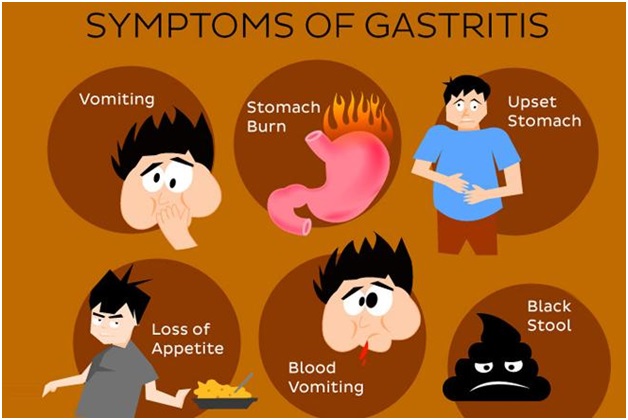Gastritis has become a common phenomenon among young as well as adults in India due to fact that our food contains high amounts of spices. Current lifestyle of working at odd hours, eating at odd hours like, midnight biryani lead to adverse effects on digestive system. Let’s know more about Gastritis, what are its main causes, symptoms and treatment options.
What is Gastritis?
Gastritis is an inflammation, irritation, or erosion of the lining of stomach. It may occur suddenly as a short episode (acute) or may be for a long duration (chronic). Gastritis is believed to affect half of the population. The disease becomes more common as people get older. Spicy food is only one of the causes of gastritis. Let’s look at the others in detail.
Causes of Gastritis
Common causes of gastritis include:
Helicobacter pylori (H. pylori):
H. pylori is a bacteria found usually in the mucous lining of the stomach. H.pylori is present in gastric mucosa of most of the human beings and it plays an important role in the natural stomach ecology. However, sometimes it leads to an infection and development of chronic gastritis and in some individuals it progresses to other complications like gastric ulcer, gastric neoplasias and stomach cancer.
Pernicious anemia:
A type of anemia that occurs when the stomach lacks a naturally occurring substance needed to properly absorb and digest vitamin B12. The loss of ability to absorb vitamin B12 is the most common cause of adult vitamin B12 deficiency.
Bile reflux:
Backflow of bile into the stomach from the bile tract. Bile tract connects the liver and the gall bladder. Bile is a yellowish fluid produced by the liver that aids in digestion of lipids in the small intestine. Backflow of bile in stomach can have adverse effects.
Use of NSAIDs:
Nonsteroidal anti-inflammatory drugs are a drug class that groups together drugs that provides pain killing and fever reducing effects. Long term usage of NSAIDs cause gastric erosions, which can become stomach ulcers.
Less common causes of Gastritis include irritation caused due to excessive usage of alcohol, smoking, severe illness, chronic vomiting, stress and autoimmune problems among others.
Symptoms of Gastritis
Symptoms of gastritis vary from person to person. Severe gastritis may be present without any symptoms. Conversely, severe gastric symptoms may be present despite only minor changes in the stomach lining. However, some of the most common symptoms include
- Pain or discomfort in the upper abdomen (the most common symptom)
- Belching, which either doesn’t relieve pain or only relieves it briefly
- Nausea and vomiting. Severity of vomiting depends on the extent of stomach inflammation.
- Burning or gnawing feeling in the stomach between meals or at night
- Chest pain or severe stomach pain
- Bloody bowel movements or dark, very foul smelling stools
Diagnostics of Gastritis
Diagnostics for gastritis involve complete review of your medical history and performing a thorough physical evaluation. The Gastroenterologist will interview the patient about symptoms, complete medical history, lifestyles and habits, and any medications taken by the patient. Generally, this information is enough to make the diagnosis in many people. Sometimes, it is recommended to go for
- Endoscopy – to determine the extent of inflammation and may perform biopsy.
- Blood tests – Various blood tests may be needed such as checking your red blood cells count to determine whether you have anemia, H. pylori test to determine the presence of H. pylori bacteria etc
- Stool test – This test checks for the presence of blood in your stool, a sign of gastritis
Treatment of Gastritis
Once the diagnosis of gastritis is confirmed, treatment can begin. Treatment, to some extent, depends on the cause of the gastritis. Treatment for gastritis generally involves
- Taking antacids to reduce stomach acid
- For gastritis caused by H. pylori infection, you are prescribed several antibiotics plus an acid blocking drug
- If pernicious anemia is the cause of gastritis, then vitamin B12 shots will be given
- Avoiding hot and spicy foods like pickles, peppers and very salty food products
- Eliminating irritating food from your diet such as lactose and gluten
- Cut on caffeine, alcoholic drinks, citric acid drinks and soft drinks.
- Don’t overload your stomach. A simple vegetable stew will help you the most.
The patient’s stomach often heals over time if the underlying cause is identified and corrected. It is generally advised to consult a specialist doctor, most likely a Gastroenterologist.
Diet for Gastritis
Eating smaller, more frequent meals and avoiding foods that are spicy, acidic, fried or fatty will help reduce symptoms. Taking alkaline rich food like spinach, cucumber, capsicum help in reducing the pain and have a positive impact on the stomach. Food that stop H. pylori growth and soothes gastric symptoms include
- Green Tea
- Yogurt
- Carrot Juice
- Coconut Water
- Green leafy vegetables
- Onions and Garlic
- Apples, fresh fruits and berries





















